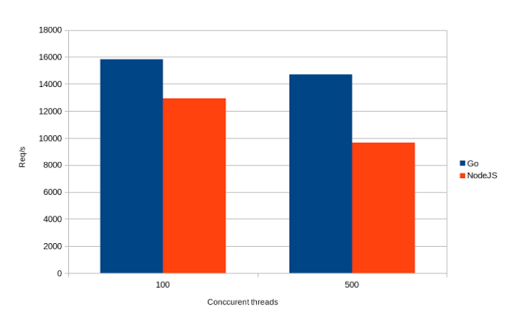Golang vs Node.js-Which Technology is Good for Server Side Programming?

The choice of server side programming language is a crucial one for your web and mobile apps to perform without any failure. Both Golang and Node.js have superior processing speed and handle multi-threaded programs really well. But, there are differences which make one company opt for Golang instead of Node.js and vice versa.
In this blog, we will try to assess various parameters for differentiating the two programming languages.
1. Performance
When it comes to performance, Golang is undoubtedly superior to Node.js.
- Since Golang is based on C and C++ characteristics, it is extremely lightweight and fast. This signifies faster computation and raw performance. Golang is a statically typed and compiled language; and having similar semantics like C means that it has quick startup time.
- The native goroutines and automatic garbage collection facilities call for less system requirements. Furthermore, it helps in clearing unused memory. Golang is extremely well-suited for microservice creation. Golang has excellent concurrency (which we will discuss in a moment) and can handle heavy loads.
- On the other hand, JavaScript is dynamically typed and the code has to be interpreted. However, TypeScript helps you create node applications, Node.js exhibits characteristics of statically typed languages. Developers have stated that the performance of Node.js varies depending on the type of app.
- Although Node.js supports single-thread, it has the ability to behave like a multi-threaded language. How? The asynchronous and non-blocking system ensures that small tasks wait in the background without disrupting the current process. The V8 engine helps Node.js to process faster.
- However, this difference becomes negligible when it comes to network communication and database connection. But many companies like Uber have migrated from Node.js to Golang. In fact, Uber has been able to build the Highest Query per Second Service due to Golang. Similarly, other companies that have made the switch from Node.js to Golang have witnessed outstanding performance.
2. Community
The Node.js community is comparatively bigger than that of Golang.
- Since, Golang has a considerably smaller community than Node.js, it means there is a dearth of tools, libraries and packages. Although, in terms of packages and libraries, the margin has reduced between Golang and Node.js.
- Today, Golang has go mod; thus, we can see a lot of packages. But, a Go developer must do his or her research thoroughly and be aware of manual configuration. Furthermore, it is very difficult to come across a Go developer when compared to Node.js.
- Node.js enjoys a huge community. This means that developers can get access to a wide range of tools, libraries and frameworks. Also, programmers get a lot of help with various development tasks. The ever-growing community is also available on Stackoverflow, and developers get all the required help necessary for developing a product.
- Developer tools like Express.js, Socket.io, Koa.js, Keystone, PM2, Babel are extremely helpful for the Node.js developers. The NPM package manager is another important aspect of Node.js, and the official website hosts over a thousand different modules and packages for developers to download and start using.
3. Concurrency
Golang beats Node.js easily in this aspect.
- Golang has excellent concurrency and parallel processing capability. It is suited for building and handling large projects, where thousands of requests have to be addressed. Furthermore, Golang is ideal for systems programming and is highly scalable.
- The goroutines and channels help Golang in maintaining its CSP-style concurrency. The channels ensure smooth communication to circumvent race conditions when it boils down to shared memory.
- The CSP model is fully synchronous, where the time when the channel reader reads, the channel writer has to block. This blocking mechanism ensures that the channel needs to hold one message. The sequential process functions in a deterministic fashion to produce the results deterministically.
- Developers cannot simultaneously run their functions in Node.js as they can do in Golang. Node.js is single threaded and it relies on the event-callback mechanism. The callback function enables the program to execute other codes when a certain task is not being finished. This means that we can only choose to wait for the result of a function to get completed.

4. Error Handling
- The method to handle errors in Golang is a bit different than other programming languages like Python, JavaScript, etc. It does not make use of the try/catch methods, nor do the errors contain any stack traces.
- In Golang, the errors are represented in the form of built-in error types. Programmers often get the errors in the form of a second argument of the function. Now, it is up to them what they will do with the errors. It takes a lot of time to debug a huge project, as you can imagine.
- There are several methods of exception handling in Node.js for synchronous, asynchronous and eventful codes. Node.js usually makes use of the throw-catch error handling process. This traditional approach helps in the errors getting displayed and rectified immediately.
- However, there are many developers who prefer the error handling in Golang to Node.js. This is because error handling in Node.js can be inconsistent at times, which creates issues for the developers. On the contrary, errors in Golang are explicit, which helps the developers to figure how they want to handle them. Node,js has the drawback of added complexity because of the hidden control flow.
- As far as Google Trends is concerned, you can see that the majority of the developers opt for Node.js. However, this scenario is likely to change in the coming five years.

5. Learning Curve
Both Node.js and Golang are relatively newer than other programming languages.
- Golang has limited resources available online. And developers have to conduct extensive study in order to grasp the concepts. Although it is similar to C, it has memory safety, garbage collection and other concepts which one has to learn. Enthusiasts have to know about specific rules, pointers, interfaces, etc.
- On the other hand, Node.js is a derivative of JavaScript. So, if one has a basic understanding of the latter, it wouldn’t take him or her to learn Node.js quickly. The huge JS community, along with a plethora of online and offline resources makes it easier for programmers to learn the language easily.
6. Machine Learning
Golang is extensively used for go web development, systems programming, cloud computing, etc. And Node.js finds immense application in web development and for the creation of event-driven non-blocking servers. Neither of the languages are used heavily for Machine Learning as Python is used. However, Golang and Node.js both offer great resources.
- Golang is easy to understand. There is no need to worry about it requiring assistance from other languages because it is built to handle massive data collections. Additionally, it comes with tons of machine learning capabilities integrated right into its library.
- The native support features make it simpler and faster for programmers to create models in Golang. When it comes to using models in production, TensorFlow supports Golang, but it still lacks the right tooling for training and testing.
- Golang ensures fast execution of several machine learning programs and algorithms. However, it lacks sophisticated functionality, like GPU support.
- On the contrary, Node.js does not offer AI or machine learning functionalities on its own. However, developers can make use of libraries to incorporate AI characteristics in the JS projects. One can use ONNX.js, TorchJS, Tenserflow.js (which has both support for server and client-side). The open-source library Tenserflow.js helps you design and reuse models. You can also write a program in Python and import it to Node.js.
As you can see, Golang outclasses Node.js in many of the criteria. However, Node.js has the upperhand in some. Ultimately, it comes down to the requirements and purposes of the developer. However, if you wish to handle big projects and require fast processing, then clearly Golang is the undisputed winner. And, if you are hoping for a big salary, then Golang easily overtakes Node.js in that department. So, choose wisely.